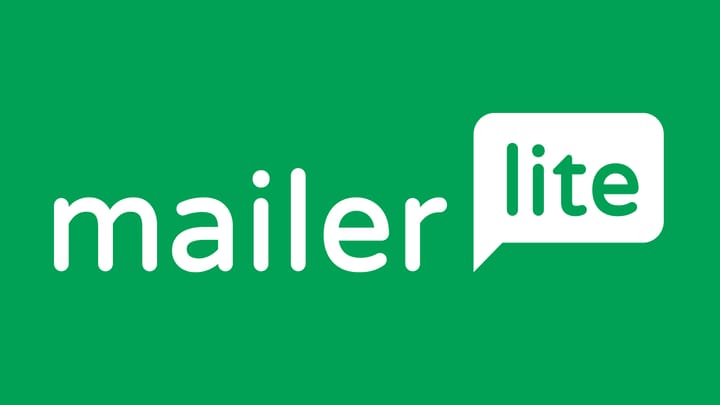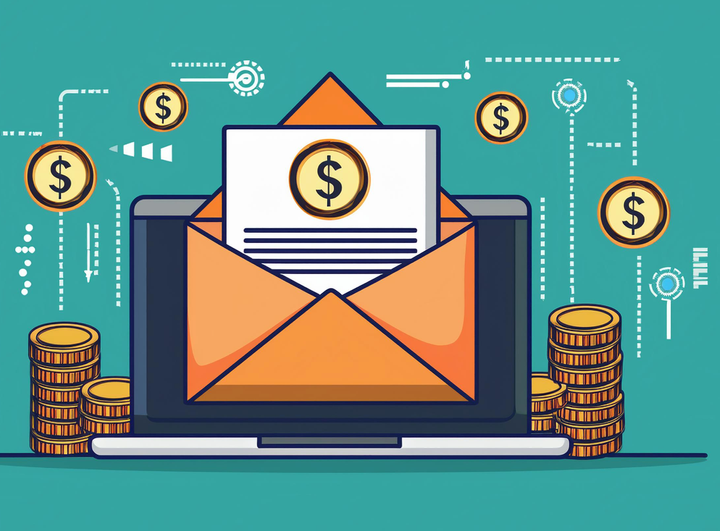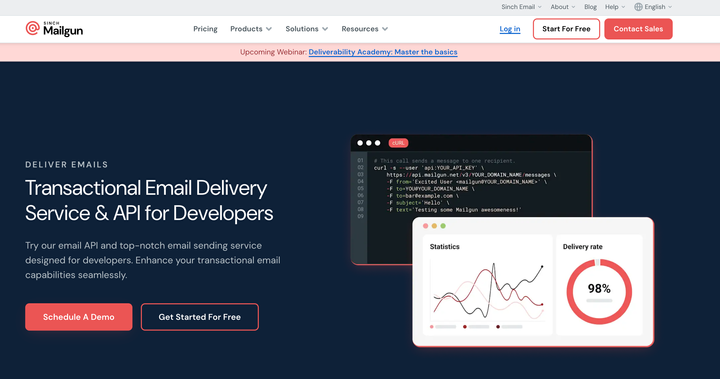Top 10 Sender Alternatives this 2025 (Complete Guide)
While Sender's generous free plan and budget-friendly pricing make it attractive for getting started, many businesses quickly bump into its limitations.
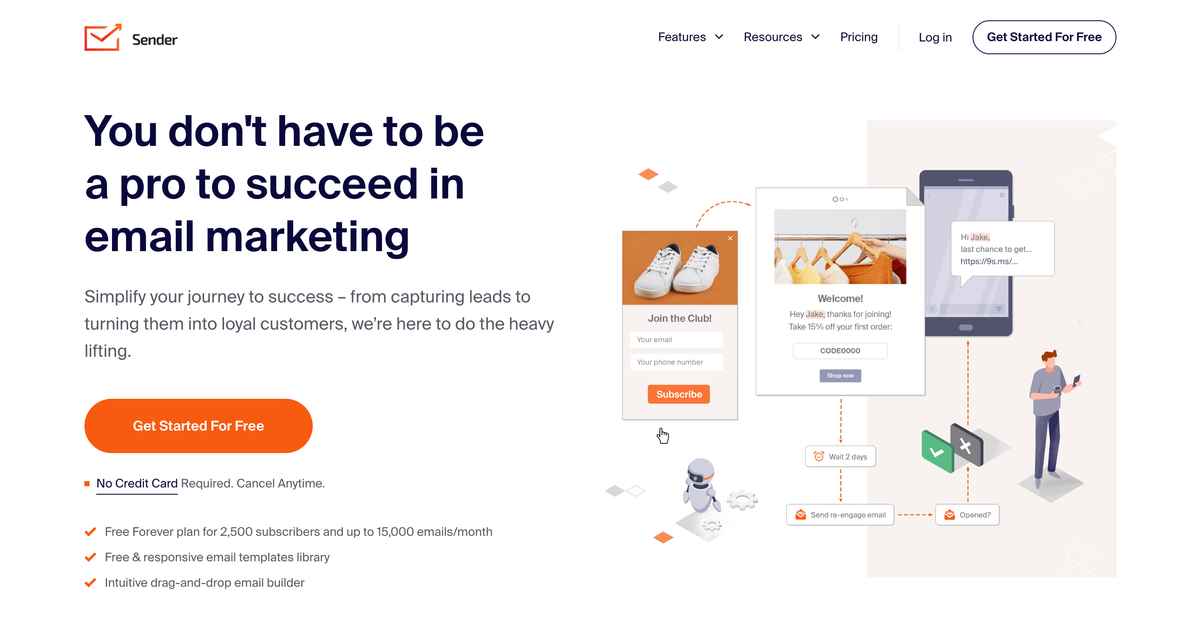
Let's be honest: Sender is decent, but it's not winning any awards for innovation.
While Sender's generous free plan and budget-friendly pricing make it attractive for getting started, many businesses quickly bump into its limitations. The email builder feels basic, template options are slim, and if you need anything beyond simple automation, you're probably already shopping around.
Sound familiar? You're not alone.
Here's the thing: you outgrow platforms as your business evolves. What worked when you had 500 subscribers might not cut it at 5,000. Maybe you need better design tools, easier automation, or integrations that actually work with your other business tools.
This guide cuts through the noise to show you 10 better alternatives. No marketing fluff, no overwhelming feature lists, just honest breakdowns of what works, what doesn't, and which platform might actually solve your problems.
1. Maileroo: The Budget Champion with Premium Support
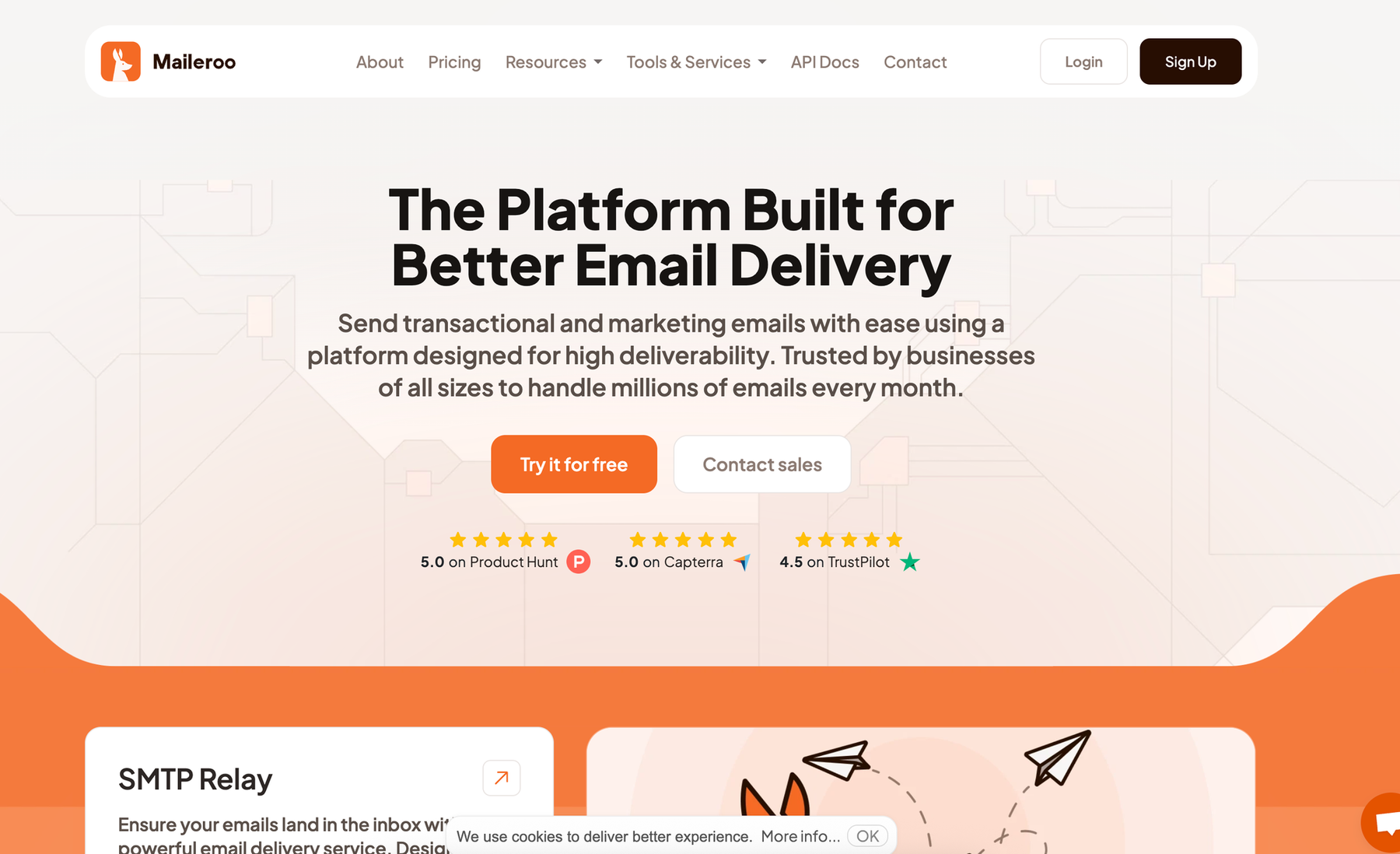
Think of Maileroo as the perfect balance between affordability and quality. It's like having a premium email marketing service at budget prices, but with the kind of customer support where you actually talk to real humans who understand your business.
Why it stands out: While other platforms nickel-and-dime you or leave you talking to chatbots, Maileroo provides genuine personal support at prices that won't shock you when your subscriber list grows.
Key features that actually matter:
- Simple drag-and-drop email builder that anyone can use
- Smart automation that nurtures leads without constant babysitting
- Real-time analytics that show you what's working (and what isn't)
- Both marketing emails and transactional emails in one platform
- Developer-friendly API for technical integrations
What it costs: Free for up to 3,000 emails per month; paid plans start at just $10/month for 25,000 emails.
Perfect for: Businesses that want reliable email marketing without premium pricing, plus the confidence that comes with responsive human support.
The good stuff:
- Outstanding value for your money
- Excellent email deliverability rates
- Quick, helpful customer support from actual people
- Straightforward setup process
The not-so-good stuff:
- Being newer means fewer pre-designed templates
- Less brand recognition than big-name competitors
- Some advanced features still in development
2. MailerLite: The User-Friendly Powerhouse
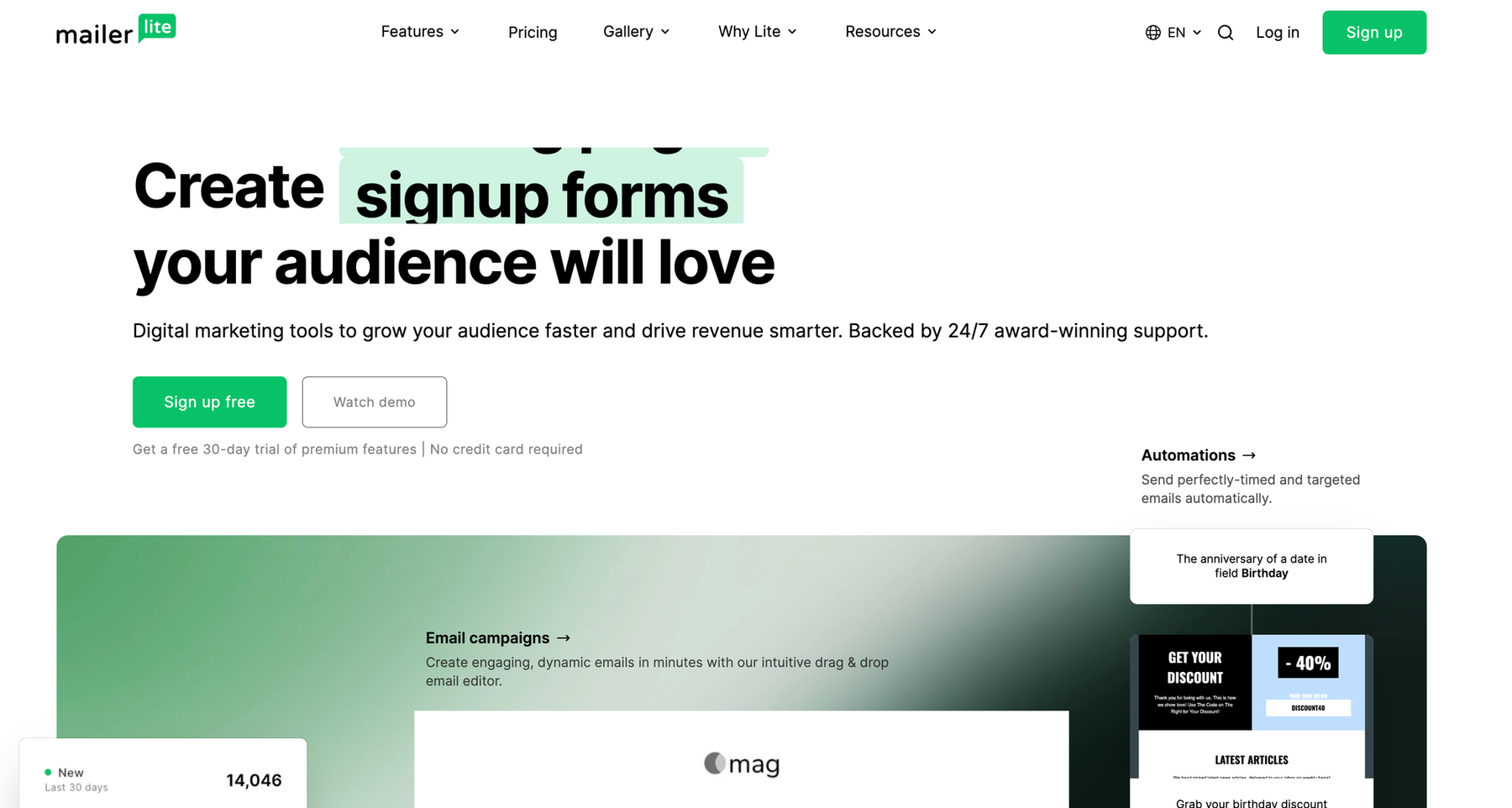
MailerLite is like the Swiss Army knife of email marketing. It has all the tools you need without being overwhelmingly complicated. It's designed for people who want powerful features but don't want to spend weeks learning how to use them.
Why people love it: You can create professional-looking emails and set up automation workflows without feeling like you need a computer science degree.
Key features that actually matter:
- Intuitive drag-and-drop editor that makes sense
- Automation workflows that you can actually understand
- Built-in landing page creator for growing your list
- Website builder for simple business sites
- Mobile app for managing campaigns on the go
What it costs: Free for up to 1,000 subscribers; the Growing Business plan starts at $10/month.
Perfect for: Small businesses and content creators who want design flexibility without the complexity of enterprise platforms.
The good stuff:
- Super intuitive interface that's easy to learn
- Excellent email deliverability rates
- Feature-rich free plan that actually provides value
- Mobile app for managing campaigns anywhere
The not-so-good stuff:
- Limited advanced automation compared to specialized platforms
- Basic segmentation options for complex targeting
- Some template customization restrictions
3. ActiveCampaign: The Automation Powerhouse
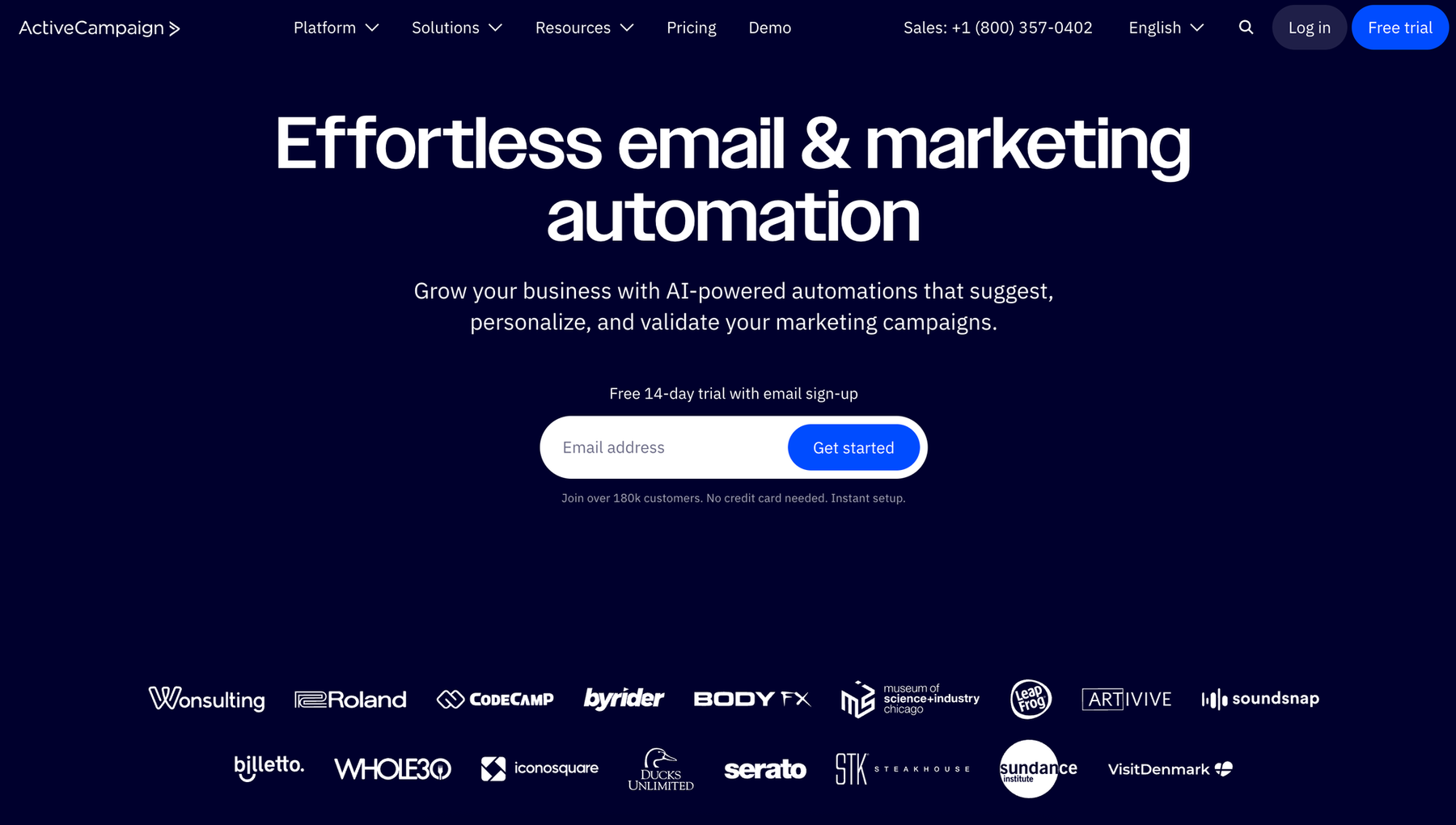
ActiveCampaign is like having a marketing automation expert on your team. It excels at creating sophisticated email sequences that respond to what your customers actually do, not just when they signed up.
Why it's powerful: Instead of sending the same email to everyone, ActiveCampaign can send different messages based on website behavior, purchase history, or how people interact with your previous emails.
Key features that actually matter:
- Advanced automation that feels almost magical
- Built-in customer relationship management (CRM)
- Predictive sending that figures out the best time to email each person
- Detailed behavioral tracking and segmentation
- Machine learning features that improve over time
What it costs: Starts at $15/month for the Starter plan.
Perfect for: Businesses ready to implement sophisticated marketing strategies and want to integrate email marketing with sales processes.
The good stuff:
- Industry-leading automation capabilities
- Excellent email deliverability rates
- Powerful segmentation for targeted messaging
- CRM features help manage customer relationships
The not-so-good stuff:
- Steeper learning curve than simpler platforms
- Interface can feel overwhelming for beginners
- Advanced features require higher-tier plans
4. Mailchimp: The All-in-One Marketing Hub
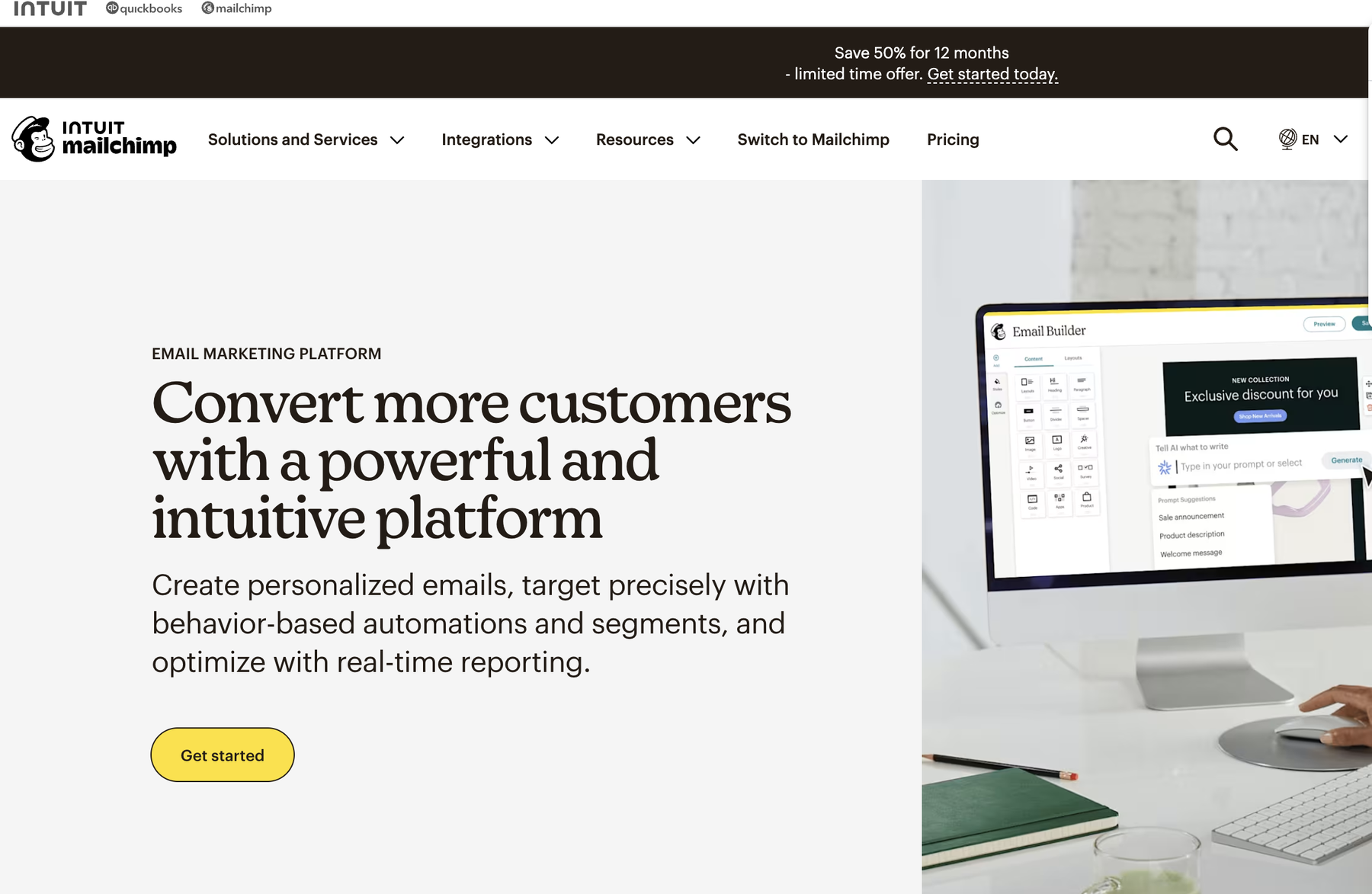
Mailchimp is like the department store of email marketing. It has everything you might need under one roof. It started as an email platform but has grown into a complete marketing suite.
Why it's popular: If you want one platform that can handle email, social media, advertising, and more, Mailchimp offers the most comprehensive set of tools.
Key features that actually matter:
- Comprehensive marketing automation
- Detailed audience insights and analytics
- Content studio for managing creative assets
- E-commerce tools for online stores
- Integrations with practically every business tool
What it costs: Free plan available; Essentials plan starts at $13/month.
Perfect for: Growing businesses that need more than just email marketing and want everything integrated in one place.
The good stuff:
- Extensive third-party integrations (over 300 apps)
- Strong analytics and reporting features
- Multi-channel marketing capabilities
- Well-established platform with extensive resources
The not-so-good stuff:
- Complex pricing structure that can surprise you
- Can become expensive quickly as your list grows
- Interface can feel overwhelming for email marketing beginners
5. GetResponse: The Webinar Marketing Specialist
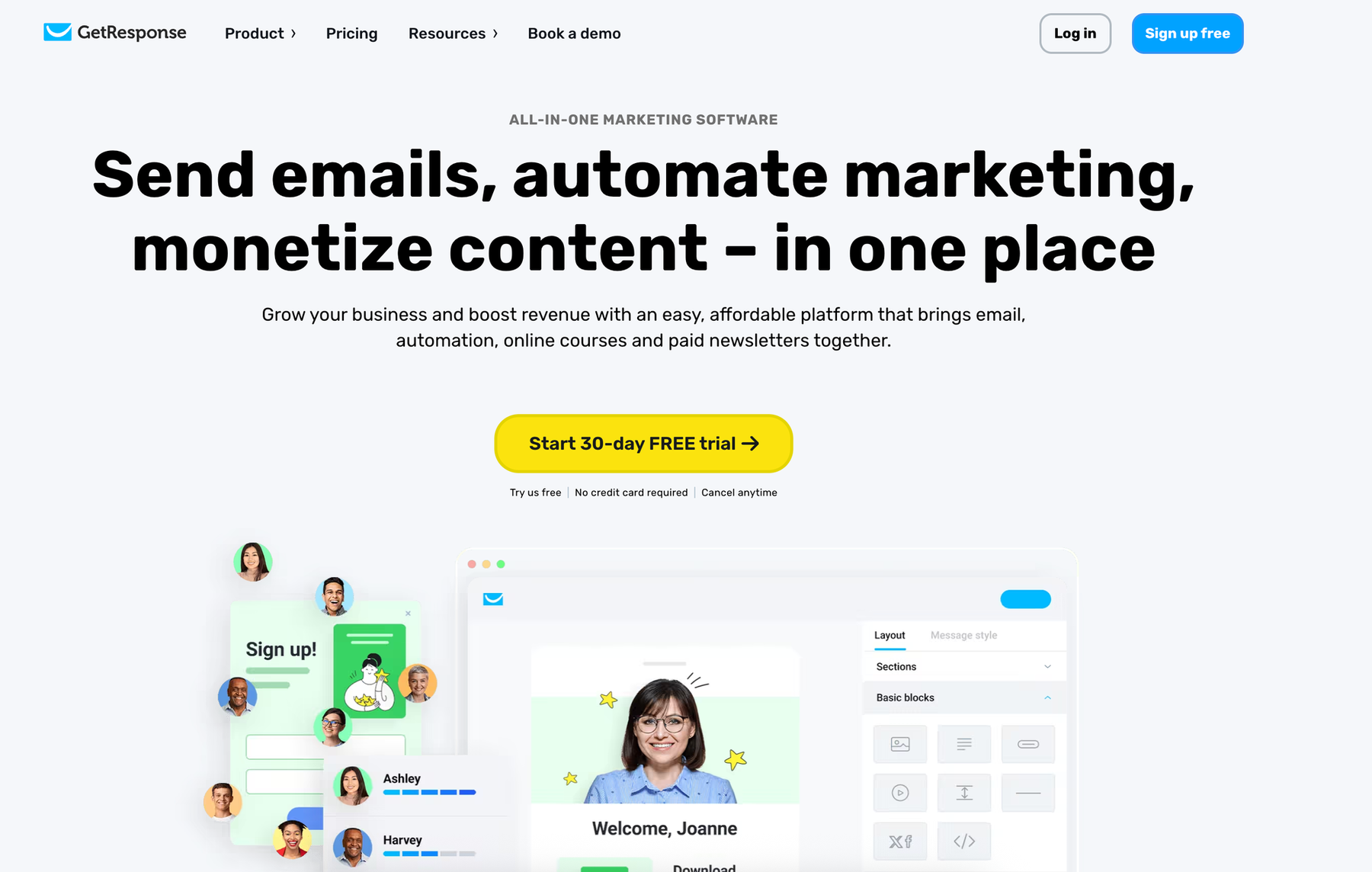
GetResponse combines email marketing with webinar hosting, making it unique among email platforms. It's like getting two essential business tools for the price of one.
Why it's different: While other platforms might integrate with webinar tools, GetResponse includes webinar hosting as a core feature, making it seamless to promote and follow up on your presentations.
Key features that actually matter:
- Built-in webinar hosting (no separate software needed)
- Email automation tied to webinar attendance
- Landing page builder for event promotion
- Conversion funnel tools for complex campaigns
- Advanced autoresponder capabilities
What it costs: Plans start at $15/month.
Perfect for: Businesses and creators who use webinars as part of their marketing or sales strategy.
The good stuff:
- Includes webinar functionality that would cost extra elsewhere
- Good automation features for lead nurturing
- Comprehensive toolset for online marketing
- Built-in landing page creator
The not-so-good stuff:
- Interface feels dated compared to newer platforms
- Webinar features might be unnecessary if you don't present online
- Learning curve to master all the features
6. Omnisend: The E-commerce Marketing Expert
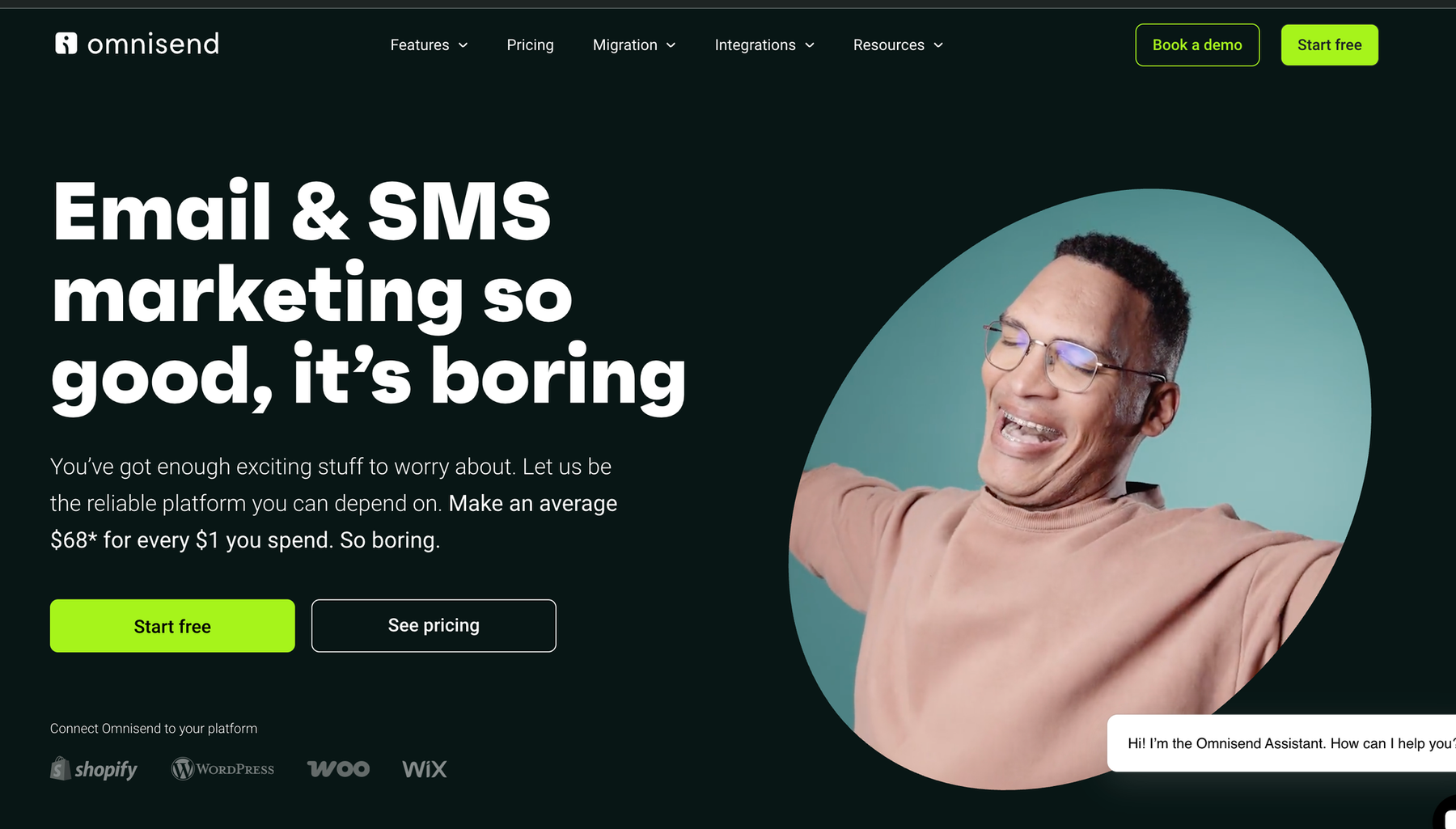
Omnisend is specifically designed for online stores and e-commerce businesses. It's like having a marketing team that understands exactly how to sell products online.
Why e-commerce businesses love it: Instead of generic email tools, Omnisend includes features like abandoned cart recovery, product recommendations, and purchase-based automation that directly impact sales.
Key features that actually matter:
- Pre-built automation workflows for e-commerce
- Combined email and SMS marketing campaigns
- Product recommendation blocks in emails
- Abandoned cart recovery sequences
- Integration with major e-commerce platforms
What it costs: Free plan available; Standard starts at $16/month.
Perfect for: E-commerce businesses that want integrated email and SMS marketing specifically designed for online selling.
The good stuff:
- Excellent integrations with e-commerce platforms
- Omnichannel capabilities across email, SMS, and web
- Pre-built workflows that work out of the box
- Features specifically designed for product sales
The not-so-good stuff:
- Primarily designed for e-commerce, less useful for other businesses
- SMS costs can add up quickly with large lists
- Limited features for non-retail businesses
7. Kit (formerly ConvertKit): The Creator's Best Friend
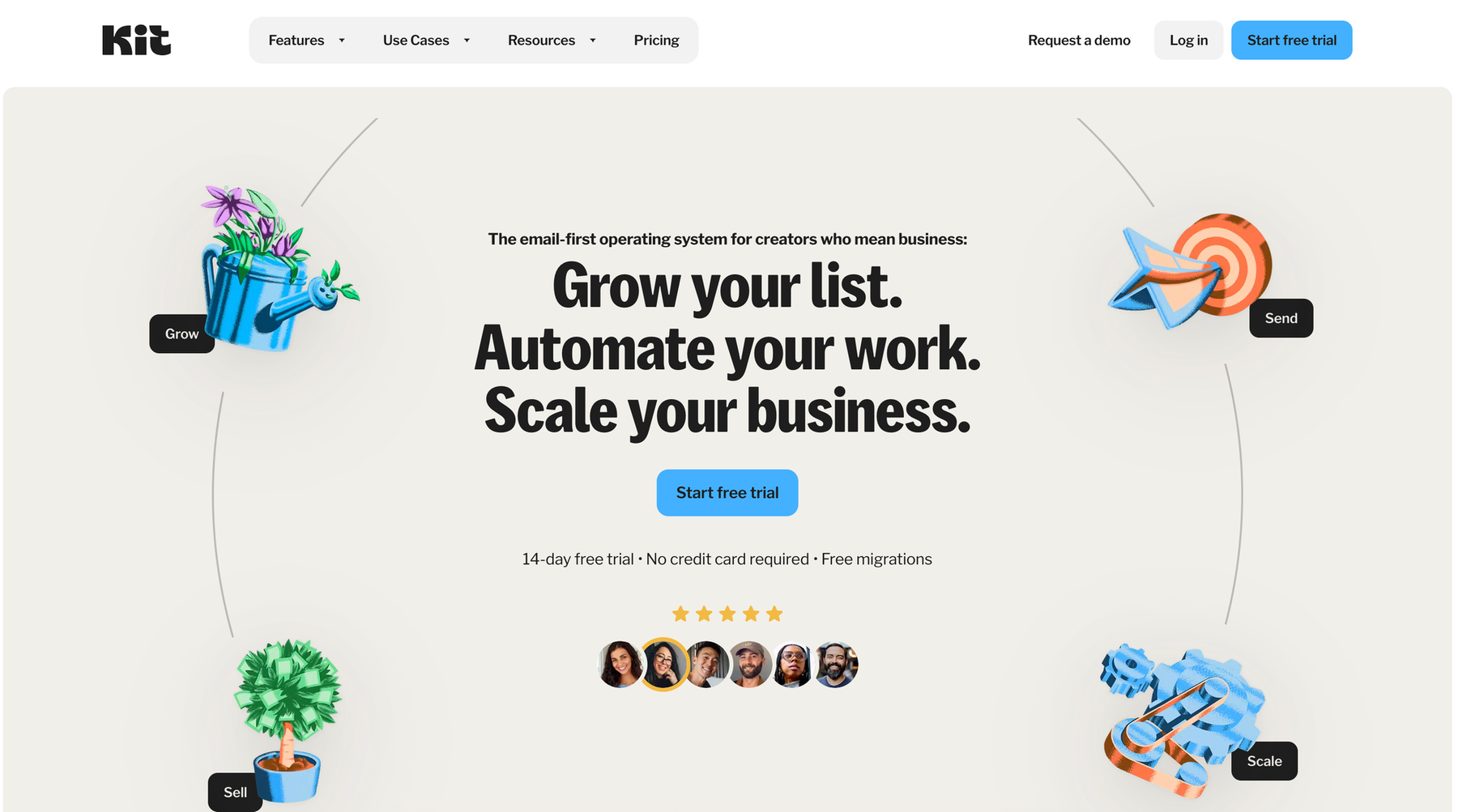
Kit was built specifically for content creators, bloggers, and digital product sellers. It focuses on helping you grow your audience and make money from your expertise.
Why creators love it: Instead of trying to be everything to everyone, Kit concentrates on the features that matter most to people who make money from their knowledge and content.
Key features that actually matter:
- Visual automation builder designed for creator workflows
- Sophisticated subscriber tagging system
- Built-in tools for selling digital products
- Landing pages optimized for conversions
- Creator community and networking features
What it costs: Free for up to 10,000 subscribers (with limited features); Creator plans start at $29/month.
Perfect for: Content creators, bloggers, podcasters, and digital product sellers who want to monetize their audience.
The good stuff:
- Purpose-built for creators and their specific needs
- Simple, clean interface that's easy to learn
- Excellent email deliverability performance
- Strong community of creators sharing strategies
The not-so-good stuff:
- Limited design options compared to other platforms
- Higher price point than some alternatives
- Basic email editor if you want fancy designs
8. Brevo (formerly Sendinblue): The Multi-Channel Master
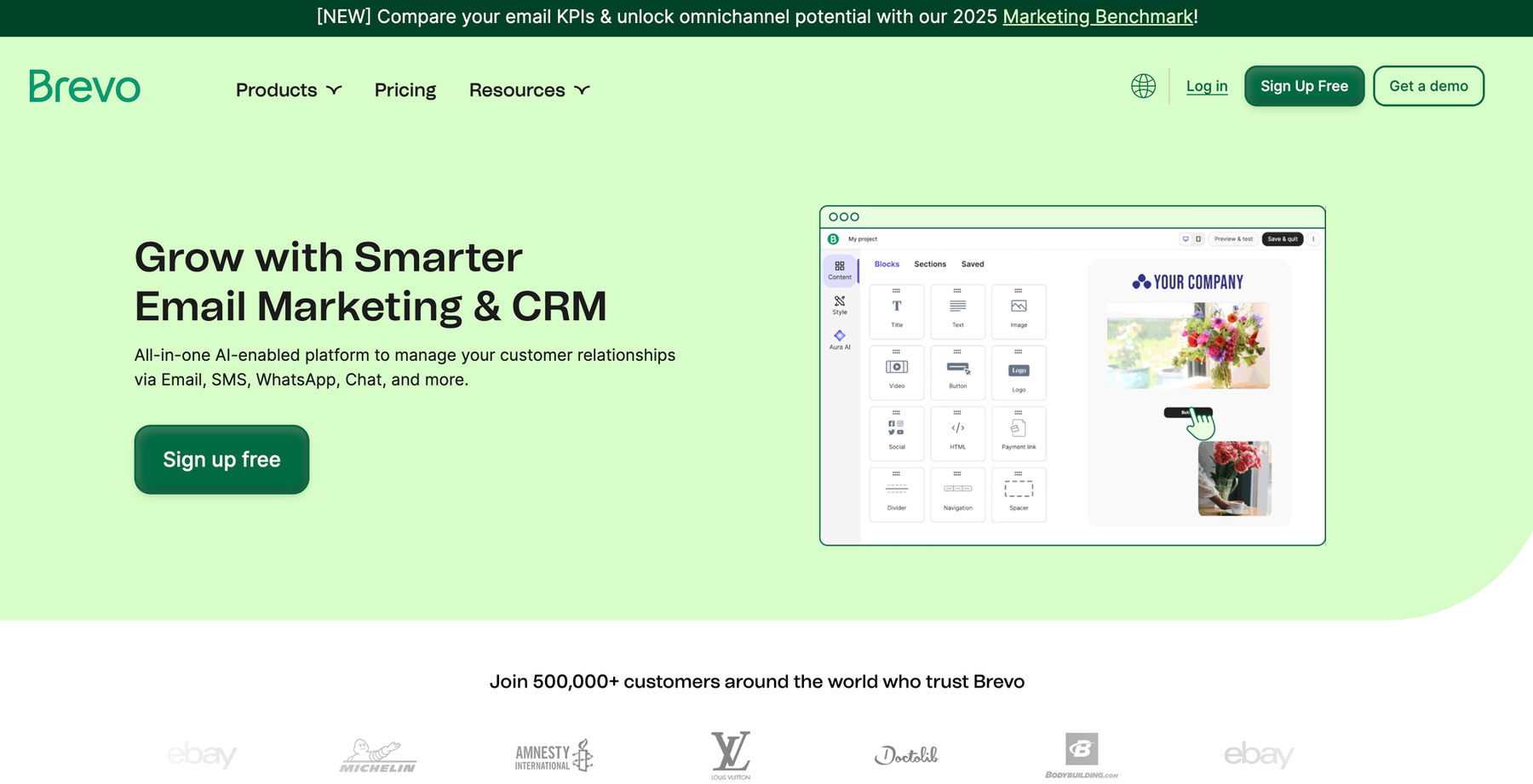
Brevo delivers a comprehensive marketing platform that combines email, SMS, and chat capabilities in one integrated solution.
Why it's appealing: Instead of managing separate platforms for email, SMS, and chat, Brevo lets you coordinate all your customer communications from one place.
Key features that actually matter:
- Combined email and SMS marketing
- Live chat functionality for website visitors
- Transactional emails for order confirmations
- Basic CRM for managing customer relationships
- Unlimited contact storage on most plans
What it costs: Free plan available; starter plan at $9/month for 5,000 emails.
Perfect for: Businesses that want to reach customers through multiple channels without managing separate platforms.
The good stuff:
- Generous free plan that doesn't limit your contact list size
- Includes SMS and chat capabilities
- Good for businesses needing transactional emails
- All-in-one approach simplifies your marketing stack
The not-so-good stuff:
- Daily sending limits on the free plan
- Interface can be slow and clunky at times
- Limited e-commerce specific features
9. Moosend: The E-commerce Automation Expert
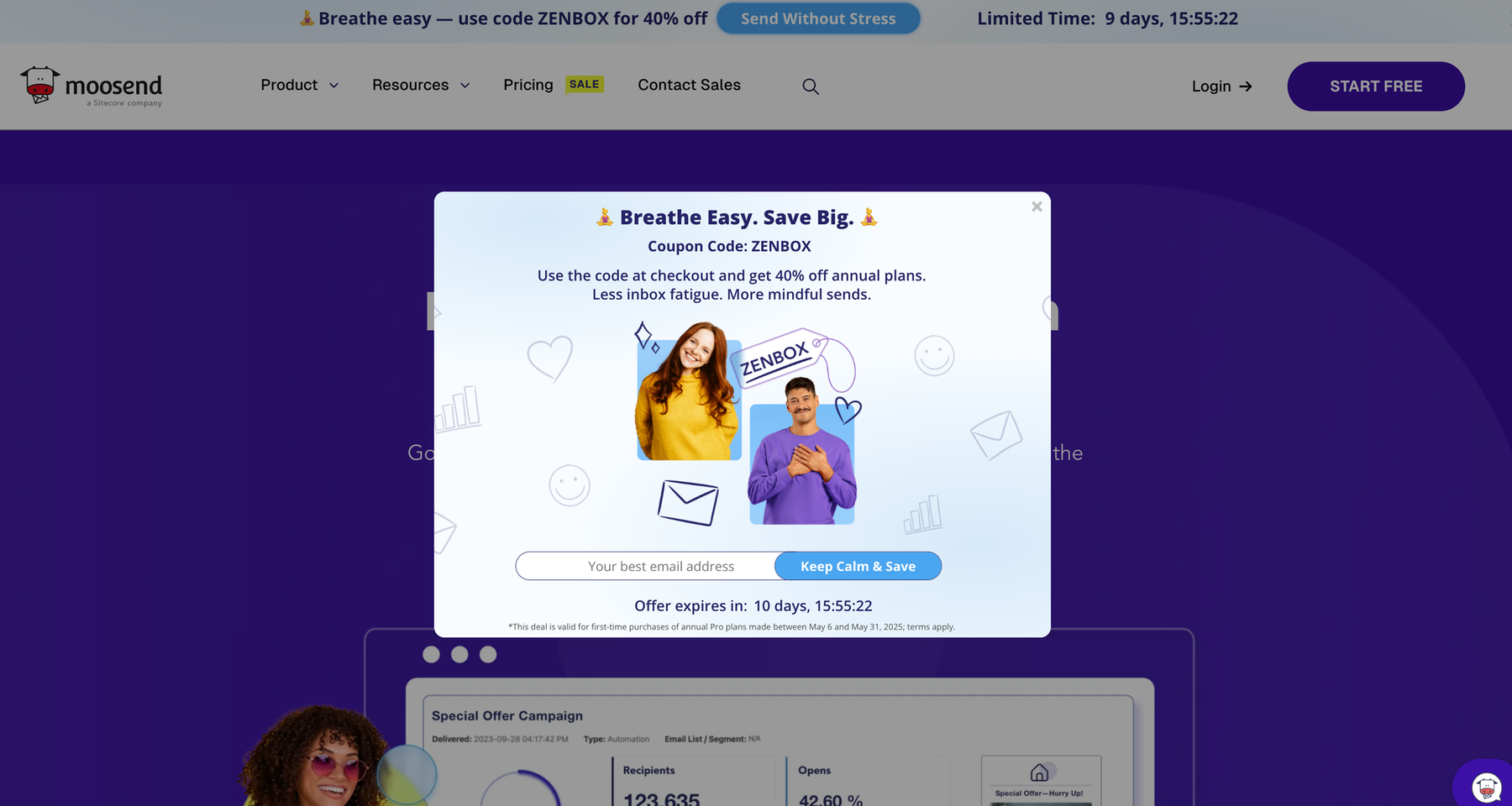
Moosend combines user-friendly email marketing with AI-powered features specifically designed to help online stores sell more products.
Why e-commerce businesses choose it: Instead of generic email tools, Moosend includes features like AI-powered product recommendations and behavioral automation that directly impact your bottom line.
Key features that actually matter:
- Intuitive drag-and-drop email editor
- AI that recommends products to individual customers
- E-commerce automation workflows (abandoned cart, post-purchase, etc.)
- Landing page builder for promotions
- Advanced segmentation based on purchase behavior
What it costs: Plans start at $9/month (no free plan available).
Perfect for: E-commerce businesses and marketers seeking powerful automation at competitive prices.
The good stuff:
- User-friendly interface that doesn't require training
- AI-powered features that increase sales
- Competitive pricing for the features offered
- Strong automation specifically for online retailers
The not-so-good stuff:
- No free plan to test the platform
- Limited integration options compared to established competitors
- Less suitable for businesses that don't sell products online
10. AWeber: The Reliable Veteran
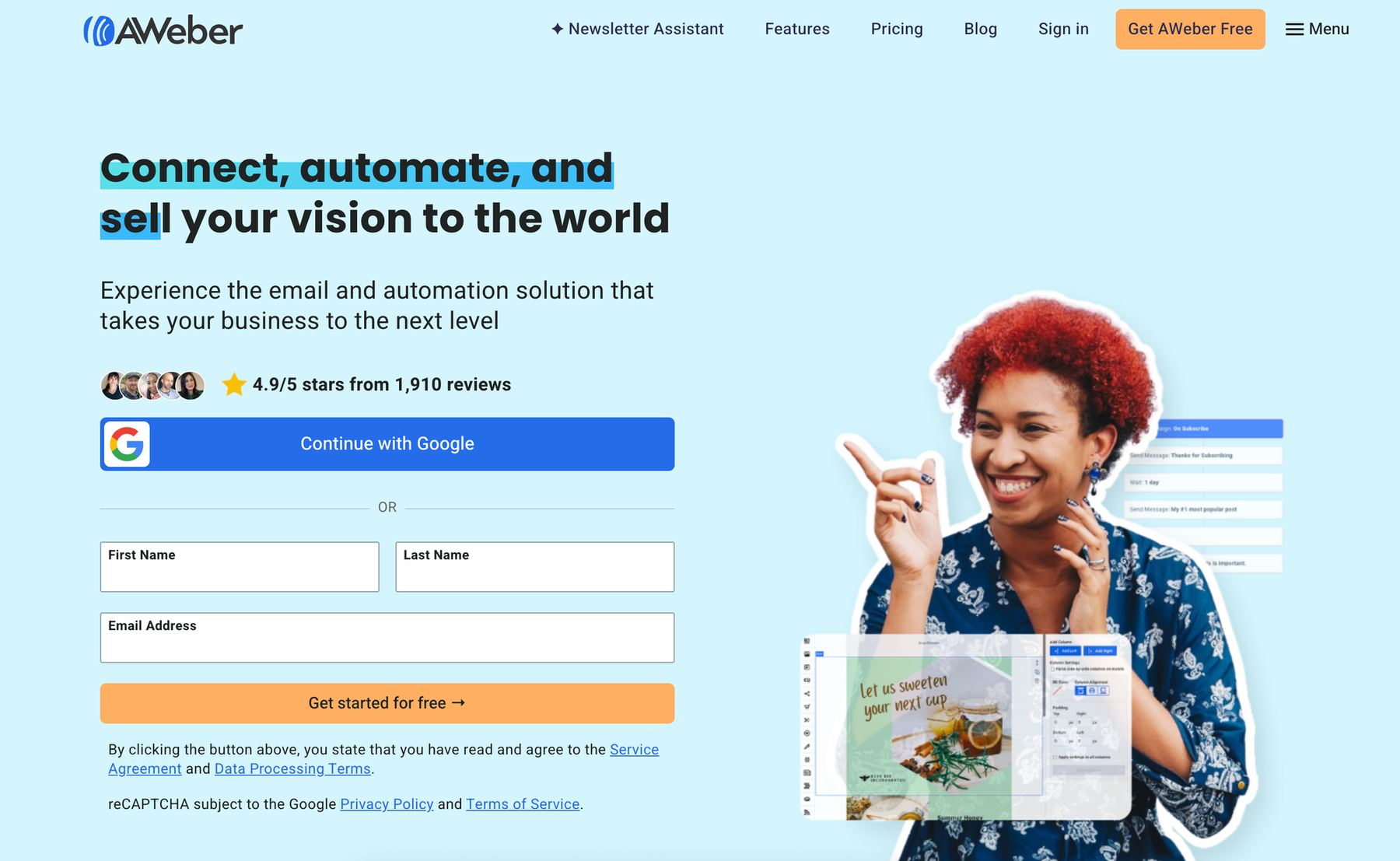
AWeber is one of the longest-established email marketing services, known for rock-solid reliability and exceptional customer support.
Why it's trusted: Sometimes you don't need the newest features—you just want something that works consistently and has people you can call when you need help.
Key features that actually matter:
- Drag-and-drop email editor with professional templates
- Email automation sequences and campaigns
- Landing page and form builder
- Web push notifications
- AI-powered content creation tools
What it costs: Free plan for up to 500 subscribers; Lite plan starts at $12.50/month.
Perfect for: Small businesses and entrepreneurs seeking reliability with excellent support.
The good stuff:
- 24/7 customer support via phone, email, and chat
- Battle-tested platform with proven reliability
- User-friendly interface with minimal learning curve
- Strong deliverability reputation
The not-so-good stuff:
- Limited automation features compared to newer platforms
- Fewer modern design options
- Interface can feel dated compared to contemporary alternatives
How to Choose the Right Sender Alternative
Finding the perfect replacement for Sender isn't just about features or price—it's about finding the right fit for your specific business needs and future growth plans.
Assess Your Business Needs
List Size and Growth Projections: Consider not just your current subscriber count but where you expect to be in 6-12 months. Some platforms become significantly more expensive as you grow, while others offer more scalable pricing.
Email Frequency and Volume: Think about how often you send emails and whether you have seasonal spikes. Some platforms charge by emails sent, others by subscriber count.
Design Requirements: Be honest about your design needs. Do you need simple, clean emails, or do you require sophisticated visual campaigns with advanced customization?
Automation Complexity: Consider whether you need basic welcome emails and follow-ups or complex behavioral workflows that respond to customer actions.
Integration Needs: List the tools you currently use and will need to connect with your email platform. This includes your website, CRM, e-commerce platform, and any other business tools.
Wrap Up
Sender is a solid platform that works well for many businesses, but it's not the perfect solution for everyone. Whether you're hitting feature limitations, need specialized tools for your industry, or simply want more design flexibility, there are excellent alternatives available.
For budget-conscious businesses seeking personal support and reliable delivery, Maileroo offers exceptional value. E-commerce businesses might benefit most from Omnisend's specialized features, while content creators should consider Kit's purpose-built tools. Companies needing sophisticated automation should look at ActiveCampaign.
Whether you choose Maileroo for its exceptional support and value, ActiveCampaign for advanced automation, or any other alternative, the most important thing is picking a platform you can depend on for the long term. Your email marketing is too important to settle for "good enough" when "great" is within reach.


